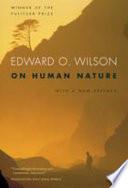Works

On Human Nature
Edward O. Wilson
The Ants
Edward O. WilsonFamous Edward O. Wilson Quotes
Can biology do better than faith?, NewScientist.com, 2 November 2005, 2010-10-26 http://www.newscientist.com/article/dn8254-can-biology-do-better-than-faith.html,
“We have Paleolithic emotions, medieval institutions, and god-like technology.”
Source: debate at the Harvard Museum of Natural History, Cambridge, Mass., 9 September 2009
Source: Consilience: The Unity of Knowledge (1998), p. 294.
Edward O. Wilson Quotes about life
Source: Consilience: The Unity of Knowledge (1998), p. 245.
Biophilia (1984)
Talk at the 50th anniversary of New Scientist magazine (2006).
On Human Nature (1978), Ch.4 Emergence
Edward O. Wilson Quotes about nature
On Human Nature (1978), Ch.4 Emergence
Gaia Atlas of Planet Management
Quoted in Harvard Magazine http://harvardmagazine.com/breaking-news/james-watson-edward-o-wilson-intellectual-entente from a public discussion between Wilson and James Watson moderated by NPR correspondent Robert Krulwich, September 9, 2009.
Edward O. Wilson: Trending quotes
“True character arises from a deeper well than religion.”
Consilience: The Unity of Knowledge (1998)
Context: True character arises from a deeper well than religion. It is the internalization of moral principles of a society, augmented by those tenets personally chosen by the individual, strong enough to endure through trials of solitude and adversity. The principles are fitted together into what we call integrity, literally the integrated self, wherein personal decisions feel good and true. Character is in turn the enduring source of virtue. It stands by itself and excites admiration in others. It is not obedience to authority, and while it is often consistent with and reinforced by religious belief, it is not piety.
Source: Consilience: The Unity of Knowledge (1998), p. 277-278.
Context: Few will doubt that humankind has created a planet-sized problem for itself. No one wished it so, but we are the first species to become a geophysical force, altering Earth's climate, a role previously reserved for tectonics, sun flares, and glacial cycles. We are also the greatest destroyer of life since the ten-kilometer-wide meteorite that landed near Yucatan and ended the Age of Reptiles sixty-five million years ago. Through overpopulation we have put ourselves in danger of running out of food and water. So a very Faustian choice is upon us: whether to accept our corrosive and risky behavior as the unavoidable price of population and economic growth, or to take stock of ourselves and search for a new environmental ethic.
“Wonderful theory, wrong species.”
On Marxism, which he considered more suited to ants than to humans.
http://arts.independent.co.uk/books/news/article2886394.ece.
Edward O. Wilson Quotes
Source: Consilience: The Unity of Knowledge
On Human Nature (1978), Ch.4 Emergence
“Much of good science — and perhaps all of great science — has its roots in fantasy.”
Source: Letters to a Young Scientist (2013), chapter 5, "The Creative Process", page 69.
On Human Nature (1978), Ch.3 Development
“The mosquito is an automaton. It can afford to be nothing else.”
On Human Nature (1978), Ch.3 Development
On Human Nature (1978), Ch.5 Aggression
http://www.independent.co.uk/news/science/why-richard-dawkins-is-no-scientist-the-survival-of-the-least-selfish-and-what-ants-can-tell-us-about-humans-eo-wilson-on-his-new-book-the-meaning-of-human-existence-9849956.html
On Human Nature (1978), Ch.3 Development
On Human Nature (1978), Ch.4 Emergence
Source: Consilience: The Unity of Knowledge (1998), p. 262.
“The borderline between normal and schizophrenic people is broad and nearly imperceptible.”
On Human Nature (1978), Ch.3 Development
On Human Nature (1978), Ch.5 Aggression
On Human Nature (1978), Ch.4 Emergence
On Human Nature (1978), Ch.3 Development
On Human Nature (1978), Ch.5 Aggression
“The emergence of civilization has everywhere followed a definable sequence.”
On Human Nature (1978), Ch.4 Emergence
On Human Nature (1978), Ch.3 Development
Source: Letters to a Young Scientist (2013), chapter 16, "Searching for New Worlds on Earth", page 177.
“To know how scientists engage in visual imagery is to understand how they think creatively.”
Source: Letters to a Young Scientist (2013), chapter 5, "The Creative Process", page 69.
On Human Nature (1978), Ch.3 Development
The Diversity of Life
“This planet can be a paradise in the 22nd century.”
Statement quoted at the "TED Prize" website, which he won in 2007 http://ted.com/tedprize/winners2007.cfm
On Human Nature (1978), Ch.4 Emergence
Source: Consilience: The Unity of Knowledge (1998), p. 264.
“The incest taboo is another major category of primed learning.”
On Human Nature (1978), Ch.3 Development
On Human Nature (1978), Ch.4 Emergence
On Human Nature (1978), Ch.4 Emergence
On Human Nature (1978), Ch.4 Emergence
“The ideal scientist thinks like a poet and only later works like a bookkeeper.”
Source: Letters to a Young Scientist (2013), chapter 5, "The Creative Process", page 74.
On Human Nature (1978), Ch.4 Emergence
“In early history phobias might have provided the extra margin needed to insure survival…”
On Human Nature (1978), Ch.3 Development
On Human Nature (1978), Ch.4 Emergence
